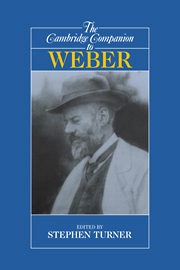Book contents
- Frontmatter
- Introduction
- PART I RATIONALITY, RATIONALIZATION, AND PSYCHOLOGY
- PART II POLITICS AND CULTURE
- 4 The rule of man over man: politics, power and legitimation
- 5 Weber on the cultural situation of the modern age
- 6 Global capitalism and multi-ethnicity: Max Weber then and now
- 7 Constitutional Caesarism: Weber’s politics in their German context
- PART III RELIGIONS AND THEIR ECONOMIC ETHICS
- PART IV LAW AND ECONOMICS
- Further reading
- Index
7 - Constitutional Caesarism: Weber’s politics in their German context
from PART II - POLITICS AND CULTURE
Published online by Cambridge University Press: 28 May 2012
- Frontmatter
- Introduction
- PART I RATIONALITY, RATIONALIZATION, AND PSYCHOLOGY
- PART II POLITICS AND CULTURE
- 4 The rule of man over man: politics, power and legitimation
- 5 Weber on the cultural situation of the modern age
- 6 Global capitalism and multi-ethnicity: Max Weber then and now
- 7 Constitutional Caesarism: Weber’s politics in their German context
- PART III RELIGIONS AND THEIR ECONOMIC ETHICS
- PART IV LAW AND ECONOMICS
- Further reading
- Index
Summary
Max Weber's true calling was to become a politician. In an often quoted letter to Mina Tobler, he refers to politics as his secret love. Yet Weber was acutely aware of his own limitations and why they excluded him from politics. He recognized his inability – vividly evident in his life as a scholar – to compromise, as well as his unsuitedness to the “slow, strong drilling through hard boards, with a combination of passion and a sense of judgment,” that he believed politics to require (PW 369). Nevertheless, he waited in the background for circumstances to hand him a political role. But his moment never came.
Weber's unhappy passion for politics had long and complex consequences. He was one of the few figures in German intellectual life to have a well-developed conception of politics that (also) rose above party-political interests. The members of his circle, such as Karl Jaspers, took up the task of the political education of Germany in the few moments in which events provided an opening, such as the early years of the Weimar Republic, the period just before its demise, and the period immediately after the Second World War, when democracy was reintroduced at bayonet tip. Weber was treated retrospectively as a substitute “founding father” for the Federal Republic of Germany by his close admirers in Germany. And this political mythologization of Weber produced a powerful scholarly reaction that has ever since colored perceptions of Weber's politics, notably by emphasizing the ways in which Weber was unlike liberal democrats elsewhere.
- Type
- Chapter
- Information
- The Cambridge Companion to Weber , pp. 131 - 148Publisher: Cambridge University PressPrint publication year: 2000
- 13
- Cited by

